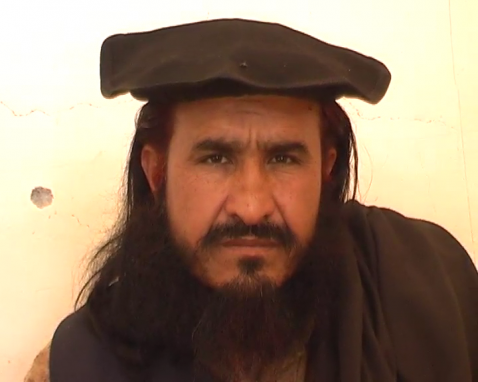|
|
|
Faqir Mohammed. Image courtesy of AfPax Insider. |
Faqir Mohammed, the former emir in Bajaur of the Movement of the Taliban in Pakistan, has returned to the fold after his dismissal a year ago for conducting negotiations with the Pakistani government. Faqir is close to al Qaeda emir Ayman al Zawahiri.
Faqir recently appeared on a videotape with Maulvi Abu Bakr, the new emir for the Taliban in the Pakistani tribal agency of Bajaur, along with four commanders identified as “Brother Ahmad,” Sheikh Osama, Maulana Abdullah, and Qari Zahid. The videotape, which was produced by the Taliban’s Umar Studio sometime in December 2012, was released on the Jamia Hafsa Urdu Forum, a pro-al Qaeda and Taliban website, on Jan. 22. A translation of the videotape was obtained by The Long War Journal.
The video begins with an unidentified interviewer asking Faqir if the “minor differences among the mujahideen in the tribal area of Bajaur Agency” have been resolved, and if Abu Bakr is indeed the new Taliban leader for the agency.
Faqir responds by saying that “it is a fact that there were differences among the mujahideen of Bajaur area,” but the differences were resolved after Hakeemullah Mehsud, the overall emir of the Movement of the Taliban in Pakistan, and Mullah Fazlullah, the Taliban emir for the Swat Valley, “sent a powerful and independent delegation to us.” Faqir, who also at one time served as the Taliban’s deputy leader under Baitullah Mehsud and then Hakeemullah, described Fazlullah as “the chief organizer of our movement.”
Faqir confirmed that Abu Bakr is the new emir for Bajaur. Abu Bakr replaced Mullah Dadullah, who was killed in a US airstrike in the eastern Afghan province of Kunar in August 2012. Dadullah took over the Taliban in Bajaur after a long-running dispute with Faqir led to the latter’s dismissal in March 2012. Faqir was accused of both not fighting hard enough against Pakistani forces and negotiating with the government without approval from the top leadership.
Abu Bakr also confirmed that he is the emir in Bajaur and that “the differences have been resolved as a result of the efforts of the delegation.”
In addition, Abu Bakr affirmed that the Movement of the Taliban in Pakistan seeks to wage jihad and establish a caliphate by force, which is a goal of al Qaeda.
“We will continue fighting until we achieve our current objectives of Sharia, caliphate, jihad, honor and our sacrifices …” he said. He also indicated that there are foreign fighters in the ranks, but was not specific.
Pakistani Taliban far from disorganized and defeated
Faqir’s abrupt dismissal last spring was considered by some analysts to indicate a major division within the Taliban ranks. Some local Taliban leaders in Bajaur were unhappy that Faqir had been fired, and warned it might lead to infighting. Ihsanullah Ihsan, the Taliban’s top spokesman, announced Faqir’s dismissal in an offhand manner in March 2012.
“The TTP [Tehrik-e-Taliban Pakistan or Movement of the Taliban in Pakistan] shura met with its central emir Hakeemullah Mehsud in the chair,” Ihsanullah Ihsan, the Taliban’s top spokesman said at the time. “It felt that the organization no more required the role of Maulvi Faqir Mohammad as naib [deputy] emir. From today, he will be considered a common fighter and will no longer enjoy the status of TTP naib emir.”
Faqir led the Taliban in Bajaur for years, and he is also tied to some of al Qaeda’s top leaders, including the group’s emir, Ayman al Zawahiri. In the past, Faqir sheltered Ayman al Zawahiri and other senior al Qaeda leaders; one of the first US drone strikes in Pakistan targeted Zawahiri and other top commanders in an area controlled by Faqir.
But Faqir’s return to the Taliban fold shows that the group is capable of managing internal divisions and reconciling them. Faqir noted this in the recent videotape, when he said “they are militants and militant work certainly has differences.”
Additionally, the videotape shows that the Movement of the Taliban in Pakistan is far from defeated, disorganized, and rife with leadership disputes, as the Pakistani government has claimed. Hakeemullah and Fazlullah were able to convene the Taliban’s shura, send a delegation to Bajaur to mediate the dispute, and organize the reconciliation of the Taliban factions in the tribal agencies.









4 Comments
Having fallen ‘out of favor’ then once again finding himself ‘back in the fold’ is indicative that the same circumstances that precipitated this ‘fallout’ in the first place will most likely surface again. The Tribal’s are simply incapable of any kind of a sustained relationship particularly in matters economic and or territorial in nature. And of course there is always the issue of who’s in charge & how best to execute a specific course of action.
I have only one question.
How come we, the CIA and the folks assigned to track these critters, do not know about their meetings? It is about time we had the bead on these guys and arrange their meeting with Allah.
How come we do NOT lean on Pakistan to help us find Ayman Al Zawahiri? He most likely soils his pants every day watching the Drones flying over. We should be able to smell this magott easy enough.
@Pathanoo
Why don’t you ask the Pakistani’s? Last I checked bin Laden was killed in Abbottabad. So its reasonable to assume that Al Zawahiri is ‘enjoying’ the same level of discretion if he already isn’t hanging out in the vicinity of the Red Sea or the Sahara.
I think we need to ask the reporter that knew all along where bin Laden was where this Zawahiri is hiding out. And, everytime I go to the barber he cuts off a bunch of hair instead of just plucking 1 or 2 hairs at a time.